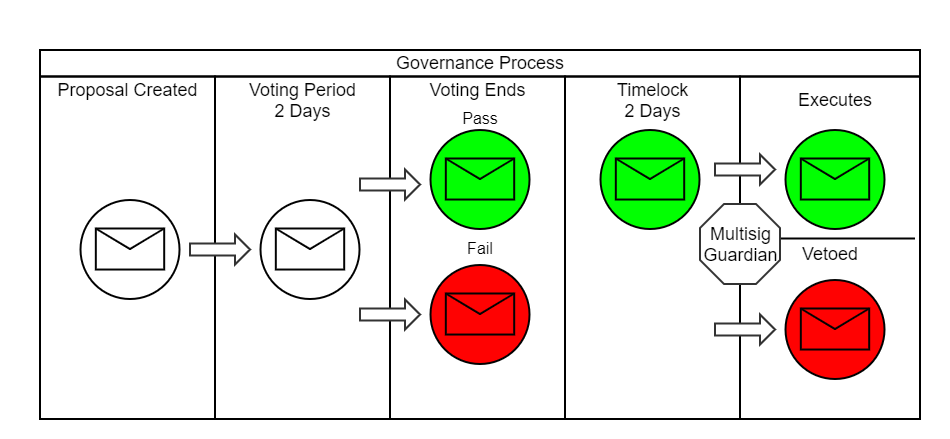Governance and DAO
Deployed Contracts
EASE
The EASE token is deployed at https://etherscan.io/address/0xea5edef1287afdf9eb8a46f9773abfc10820c61c
gvEASE
The gvEASE token is deployed at https://etherscan.io/address/0xea5edef1edb2f47b9637c029a6ac3b80a7ae1550
Timelock
The Timelock contract is deployed at https://etherscan.io/address/0xEA5edEf1401e8C312c797c27a9842e03Eb0e557a
Governor
The Governor contract is deployed at https://etherscan.io/address/0xEA5eDeF17c4FCE9C120790F3c54D6E04823dE587
DAO and RCA Guardian
The DAO and RCA Guardian located at https://etherscan.io/address/0x1f28eD9D4792a567DaD779235c2b766Ab84D8E33
Authority of the DAO
The DAO will have authority over the following scenarios
- Verifying Liquidation Quantities per vault
- Establishing new RCA vaults
- Managing vault profit model
- 400MM $EASE token disbursement in Timelock address
- Change the address of RCA Guardian
Authority of the DAO/RCA Guardian
The Guardian multisig, or Admin is a multi-signature wallet that is comprised of the Ease team, with a 3/5 requirement to execute transactions. The multi-sig has the authority over the following scenarios:
- Recognize Hack to Ecosystem
- Set Reserved Percentages of RCA Vaults (up to 50%)
- Veto of proposals in the 2 day timelock
Areas for Discussion
There are multiple places in which the user base can interact with to participate in discussion related to governance:
These are discourse powered forums that allow users to exchange ideas in a less formal manner related to governance proposals. There are currently two relevant categories Ideas and Proposals.
-
Ideas – is for a more casual exchange of ideas between governance participants
-
Proposals – This is where discussion from the Ideas category take more organized form to garner more critical feedback
This is the front-end for the governor contract where formal proposals are submitted on-chain. All proposals and voting through this front-end will be a transaction directly on the Ethereum network.
The Proposal Process
Idea Discussion
For a user to propose ideas on the forums, they do not need to even be a token holder. Discussion of ideas is open to anyone to promote a positive and open space for public discourse.
EASE to gvEASE
For a user to participate in the proposal process they must navigate to https://app.ease.org/gv-dashboard and deposit EASE tokens into gvEASE. For more information regarding our new growing vote (gv) tokenomics, visit the announcement page.
Contract Proposals
At a glance
- To make a proposal: 100,000 gvEASE
- Quorum: 50,000,000 gvEASE
- Voting Period: 2 Days
- Timelock: 2 Days
- Votes required to pass: ~51% (simple majority)
Full procedure
When a proposal is finally put to vote on chain there are a few requirements that are required
-
For a wallet to call the Propose() function the address must have a total delegation of votes equaling 100,000 $gvEASE, these can be delegated directly by the wallet address or to the wallet by other users.
-
When the proposal function is called, it enters a voting period of 2 days.
-
For the vote to pass, a quorum of 50 Million $gvEASE must be reached. A majority of those votes must be cast in the affirmative. For votes to count they must be delegated before the proposal enters the voting period.
-
-
Once the voting period ends, if the proposals passed it will enter a time lock for 2 days.
-
During the timelock the multisig treasury can act as a veto guardian to prevent the proposal from passing. This is in place to help prevent governance attacks against the protocol.
-
-
After the timelock period passes, the proposal will execute.
Glossary of Terms
Delegation: Token holders cannot vote or create proposals until they call the delegate() function and assign their voting power to a wallet address. This can be changed at any time and does not remove the tokens from the original wallet address. This value is recorded as a proposal goes live, so a wallet’s delegated votes will not be recorded if done so after a proposal is launched.
Voting: When a proposal is active users can vote using their delegated EASE tokens to vote for or against the proposal. This is done through the CastVote() function. Only votes delegated before the proposal became active our counted
Voting Period: The time in which a user can vote on a proposal before results are called. It is currently set to 2 days but is able to be changed through the proposal process.
Proposal: A proposal is a piece of executable code that can alter the functionality of the deployed EASE contracts. A user must have 100,000 gvEASE tokens delegated to their wallet address before creating a proposal on chain. A proposal then enters a 2 day voting period, if at any time during this period the proposer’s wallet address drops below the required delegate threshold. The proposal will fail.
Quorum: The required minimum number of votes needed in order for a vote to be considered valid. 50 million votes need to be submitted with a majority in the affirmative to pass a proposal.
Timelock: Any passing proposal will experience a 2 day delay before being executed. This is in place to ensure the safety of the protocol by allowing time for a veto to occur from the multisig guardian in the event of a governance attack.
$gvEase tokens: See the gvEase announcement here.